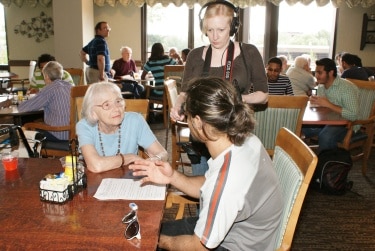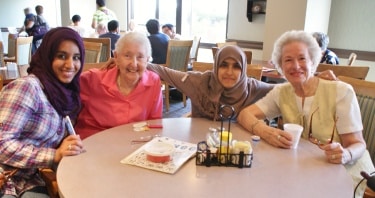 Many residents of Kenwood Retirement Community in Minneapolis once traveled the world. Now that they no longer can, that exhilarating world is coming to them.
Many residents of Kenwood Retirement Community in Minneapolis once traveled the world. Now that they no longer can, that exhilarating world is coming to them.
One afternoon every summer, more than 100 international students from the University of Minnesota’s English Language Program (MELP) spread out to visit four Twin Cities assisted-living facilities. Watching the animated multigenerational, multicultural exchange at Kenwood Thursday, it was hard to tell who scored the better deal.
The students, hailing from the Middle East, Czech Republic, China, Mali, South Korea and more, get to practice their conversational skills with the world’s most patient listeners. The residents, many of whom are retired teachers, get to take a happy walk down memory lane.
And there’s bingo to boot.
“I worked in Jamaica and Uganda,” retired librarian Jim Wellvang, 68, tells Ahmed Al-Bulushi, 19, and Alkhalil Alkindi, 18. The two young men, on scholarships from Oman, lean in to listen, then politely ask their own questions:
“Did you volunteer?”
“What kind of work did you do?”
Retired special education teacher Barbara Linde found her way to a student from China, carrying a charm given to her long ago by a friend who traveled there. She lights up when he tells her that it means “long life.”
The U’s MELP program offers many services to English language learners, from credit classes for students who want to improve their English skills, to assistance in test preparation to short-term group training. Many students seek proficiency so they can continue, or enroll, in American colleges full-time.
Aside from classroom learning, teachers take them on many jaunts, including a visit to an elementary school, a scavenger hunt in downtown Minneapolis, and on tours of Fort Snelling and the Minneapolis Institute of Arts.
This exchange began four years ago as a creative way for students to branch out, “and talk with native speakers in a real context,” said MELP spokeswoman Chelsea Nutting. The program quickly became more than an English tutorial. Last week, conversations ranged from the economy to family traditions to where to get the best burger.
“Have you tried Five Guys?” Linde asks Wael Al Arabi, 26, of Saudi Arabia.
“Yeah! I tried it,” he says with a big smile. “Great restaurant.”
A long-ago visit
He is surprised to learn that Linde traveled to Saudi Arabia 20 years ago, where she delighted in the abundance of fresh produce. “A tomato,” she says, “tasted like a tomato.”
He nods. “I like the United States.”
 The 30 students have prepared for this two-hour visit to Kenwood by filling out a two-sided sheet of paper offering helpful guidelines: “Introduce yourself — your name and where you’re from. Politely accept or refuse the snack. [This gathering is during Ramadan, so many are fasting until sunset.] Ask for permission to ask some questions about their lives.”
The 30 students have prepared for this two-hour visit to Kenwood by filling out a two-sided sheet of paper offering helpful guidelines: “Introduce yourself — your name and where you’re from. Politely accept or refuse the snack. [This gathering is during Ramadan, so many are fasting until sunset.] Ask for permission to ask some questions about their lives.”
The questions range from basic, “When did you come to the Kenwood?” to the esoteric, “What is the meaning of life for you?” Many conversation-starters are drawn from the storytelling website Story Corps.org
“It’s awesome to get residents involved in such an intellectual way,” said Kenwood activities director Anna Streich, who later leads the packed room in bingo, a new experience for some.
Kenwood residents “always get excited learning about the different countries,” Streich said. “And they also enjoy the appreciation for older adults.”
In fact, one of the most interesting, and frequent, topics of conversation is the very concept of assisted living. Most of these young people are taught from childhood that it is an honor and an obligation to take care of elderly parents.
“In China, there are some senior centers and nursing homes, but they look more like a hospital,” said 19-year-old Shu Tian. “We’re taught to live with our parents when they get old. It’s part of our custom.
“But this,” he said, laughing as he scanned the room filled with elegant furnishings, “is fantastic. Just luxury.”
By Gail Rosenblum,
StarTribune – July 20, 2013
